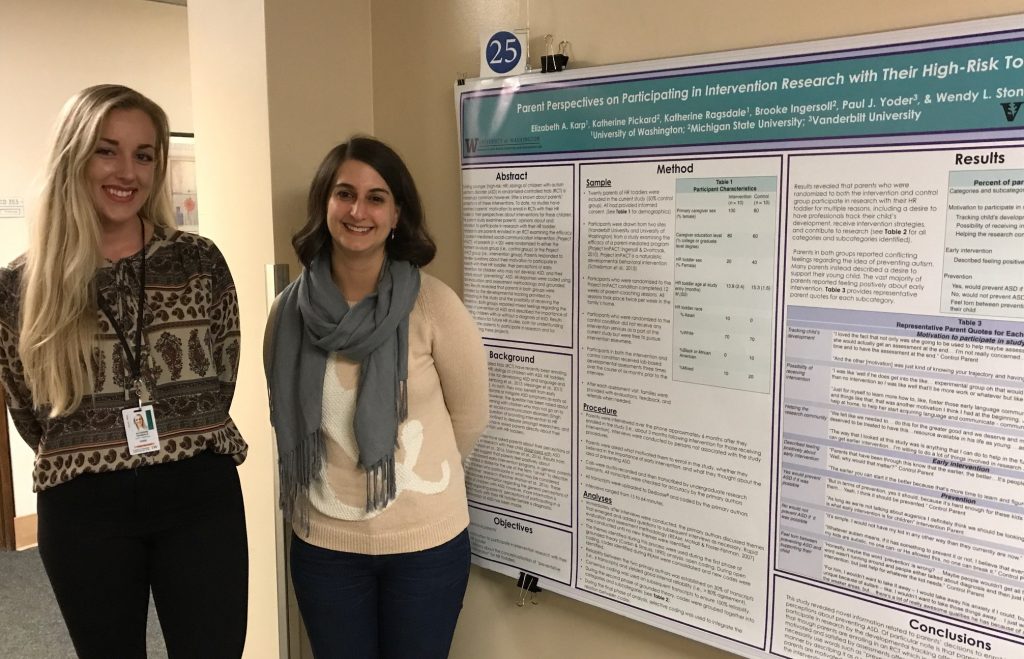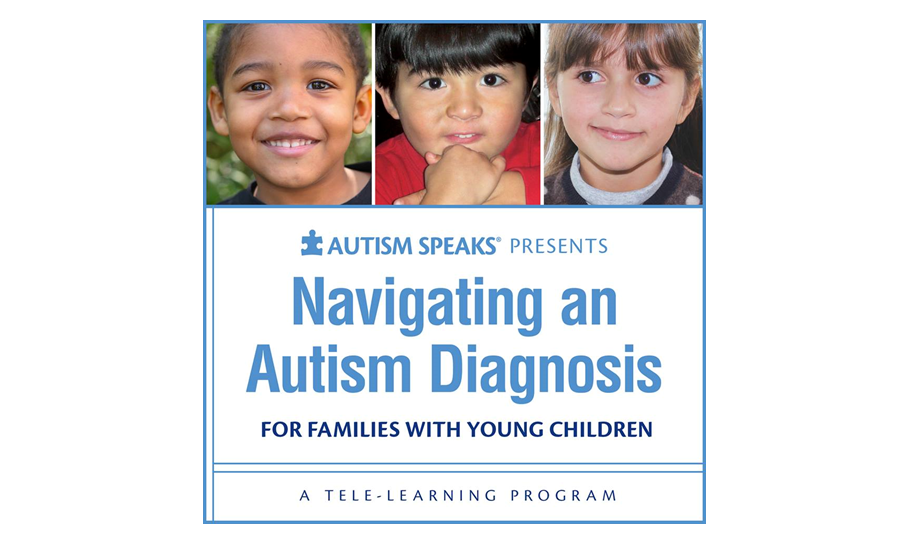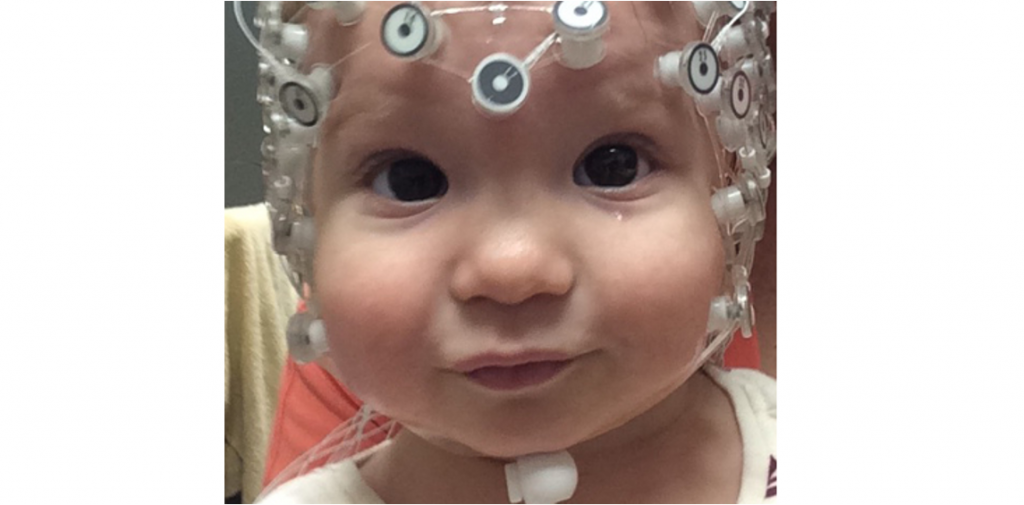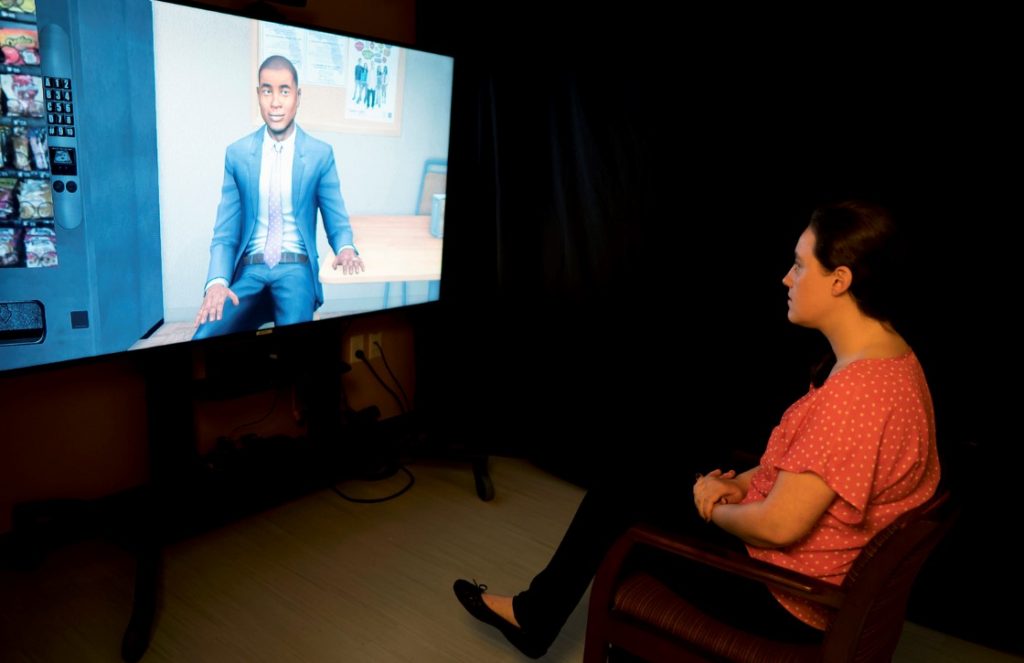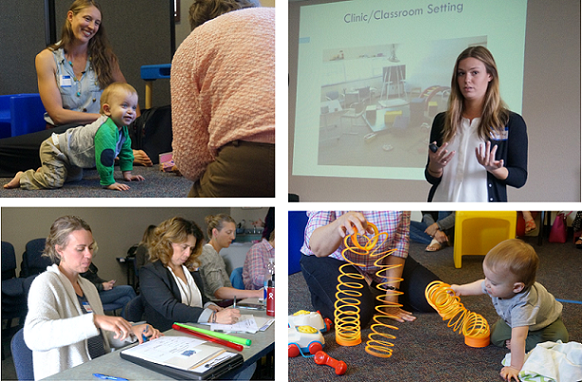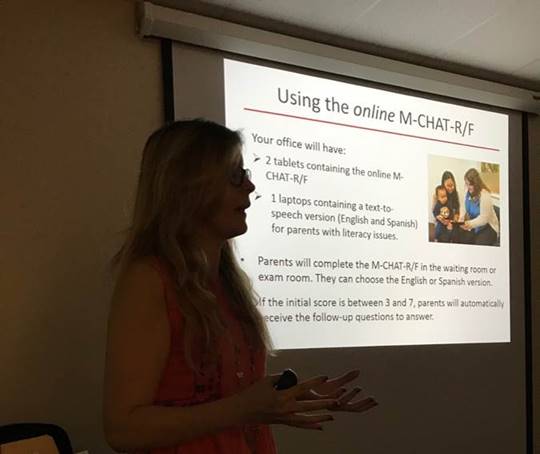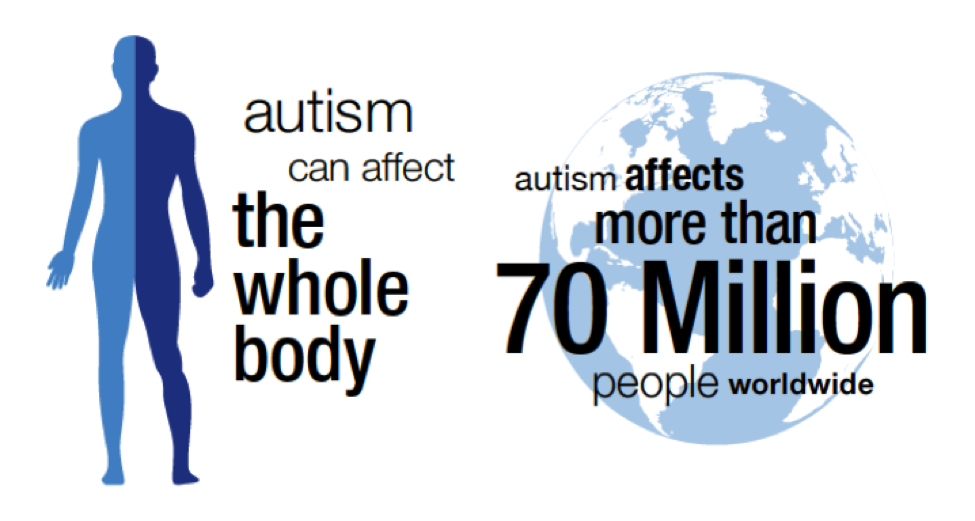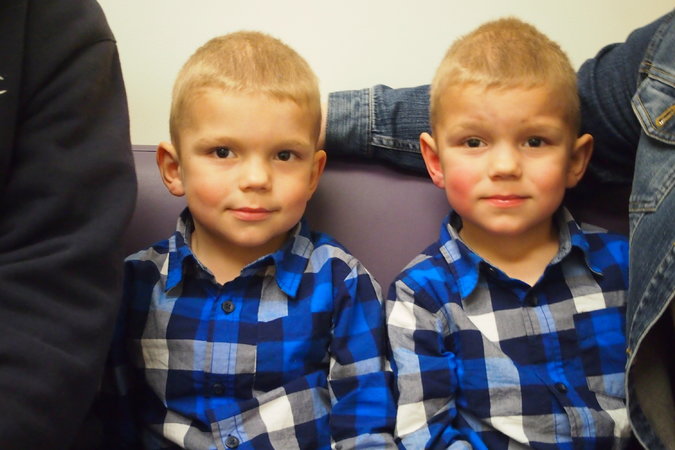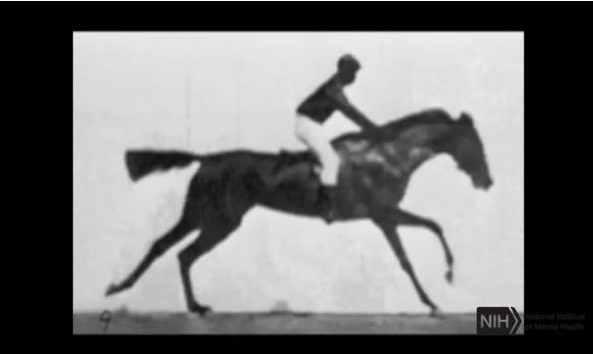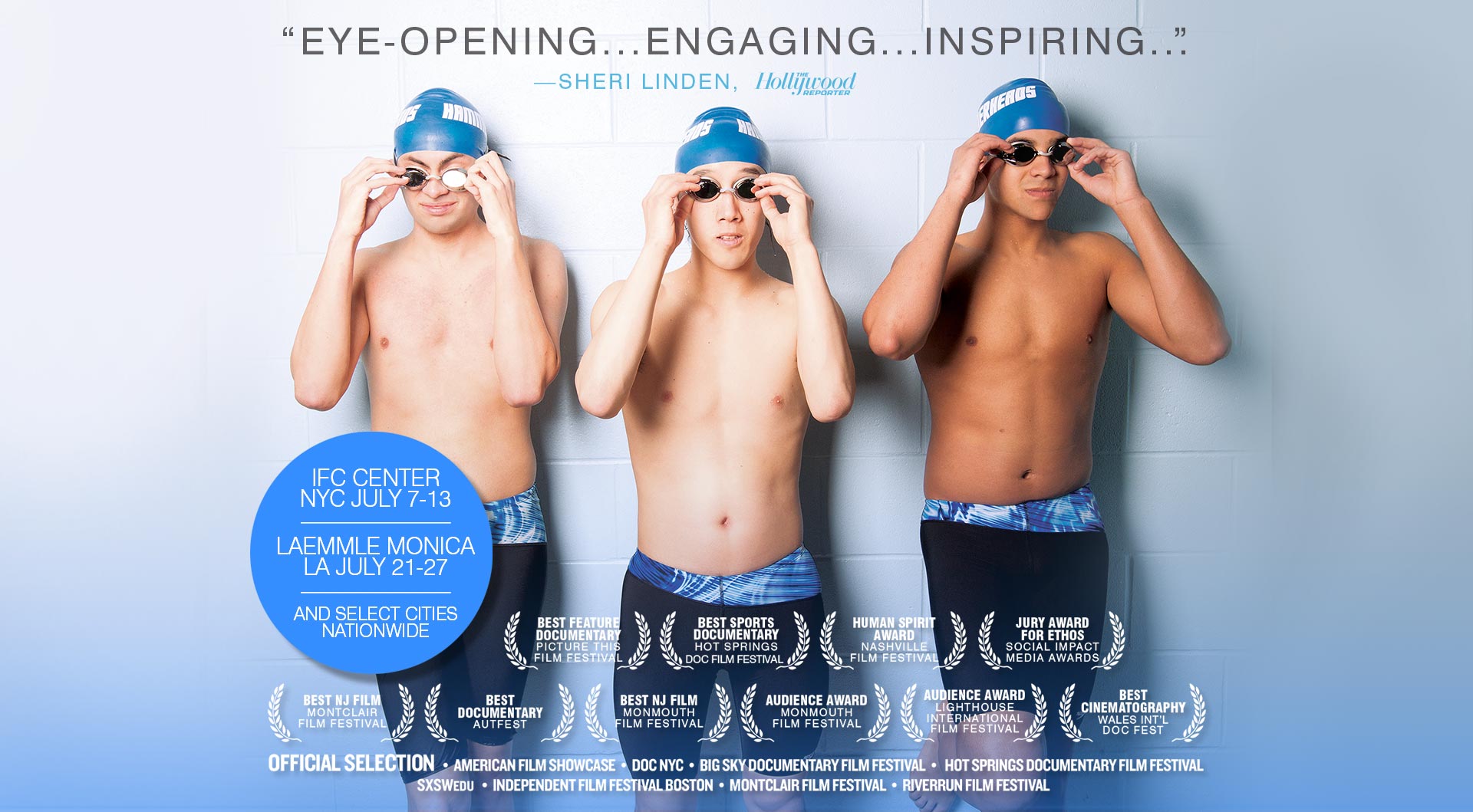READi Lab Graduate Student, Lizzy Karp, and Research Coordinator, Katie Ragsdale, stand by to answer questions about their poster describing parents’ perceptions about participating in intervention research with their toddlers. This poster represented the Consortium of Early Childhood Intervention, one of CHDD’s Collaborative Research Areas.
Dr. Stone in the spotlight again!
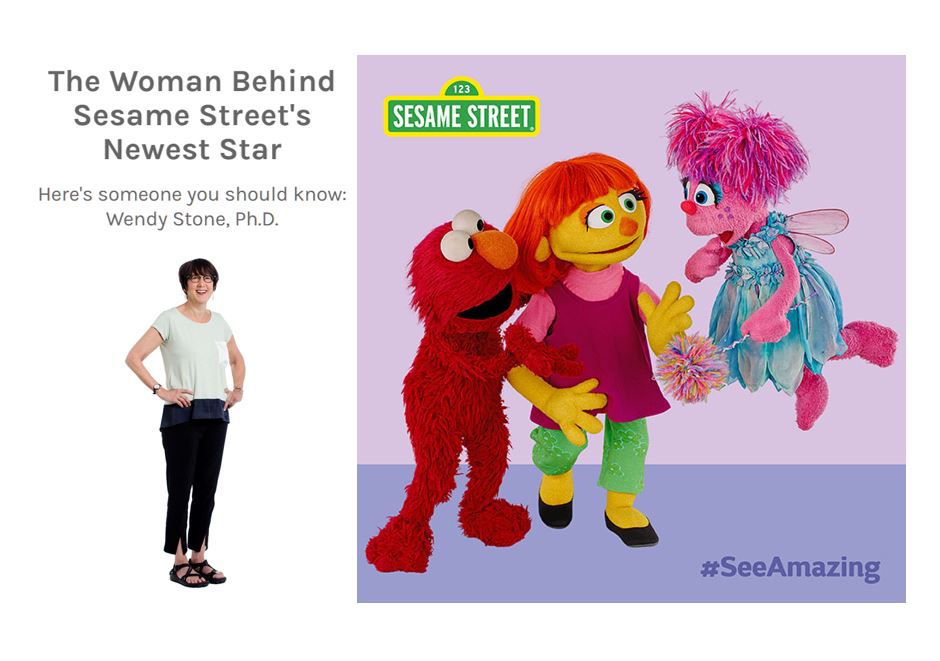 ParentMap Magazine recently published an interview with READi Lab’s own Dr. Wendy Stone! The article discusses how she has worked with Sesame Street to help create Julia, the show’s first Muppet with autism. In the interview, Dr. Stone describes some of the considerations that went into developing the character, including the desire to avoid stereotypes and to highlight both similarities and differences from other children. Sesame Street has since used Julia as a platform to share educational outreach materials for teachers, parents, and families of children with autism. Check out the full interview here: https://www.parentmap.com/article/sesame-street-julia-wendy-stone
ParentMap Magazine recently published an interview with READi Lab’s own Dr. Wendy Stone! The article discusses how she has worked with Sesame Street to help create Julia, the show’s first Muppet with autism. In the interview, Dr. Stone describes some of the considerations that went into developing the character, including the desire to avoid stereotypes and to highlight both similarities and differences from other children. Sesame Street has since used Julia as a platform to share educational outreach materials for teachers, parents, and families of children with autism. Check out the full interview here: https://www.parentmap.com/article/sesame-street-julia-wendy-stone
Watch ‘Swim Team’ Documentary on PBS!
You may have seen our recent post about the Swim Team Documentary – a short film that chronicles three teenage boys with autism who are members of the New Jersey Hammerheads YMCA Swim Team. While this film has only been available to organizations able to host a screening in their area, the time has finally arrived for it to be available to the public! Set your DVR to record the special tonight, which airs at 1:00am PST on PBS. If you are unable to record or watch when it airs, personal copies of the documentary will be available for purchase starting tomorrow on the Swim Team official website: www.swimteamthefilm.com.
My child was just diagnosed with ASD…what next?
Autism Speaks is broadcasting a free online program for parents who have a newly diagnosed child with ASD this Wednesday, September 27th at 4:00pm PST. The webinar will introduce Autism Speaks and will provide information about tools and services to help families of children with ASD. Click here to RSVP by Tuesday, September 26th (today!). Additional information about the program is available on the Autism Speaks website here!
Sensory under-responsiveness in toddlers at high risk for ASD
A new study conducted at UW and Vanderbilt found a relation between sensory under-responsiveness and brain responses in 18-month old toddlers who have older siblings with ASD. The study found correlations between hypo-responsiveness to sensory input and oscillatory power in the frontal lobe of the brain. Mapping behavioral patterns onto brain activity is an important first step to identifying potential early biological markers of ASD. READi Lab researchers Lisa Ibanez and Wendy Stone were involved in this study, which is now published online in ‘Journal of Autism and Developmental Disorders.’
Check out our Autism 200 Series Talk This Thursday at Seattle Children’s!
Dr. Lisa Ibañez will be facilitating the Autism 208 lecture from 7:00 to 8:30 pm at Seattle Children’s Wright Auditorium this Thursday (8/21), and you can join her in person or virtually! This provider-focused lecture will discuss how a preventive intervention approach may improve outcomes for both children and parents by increasing rates of ASD screening, promoting earlier referral to EI programs, initiating early ASD-specialized intervention, and reducing the time between ASD concerns and diagnosis. Check out the flyer below for more information. We hope to see you there!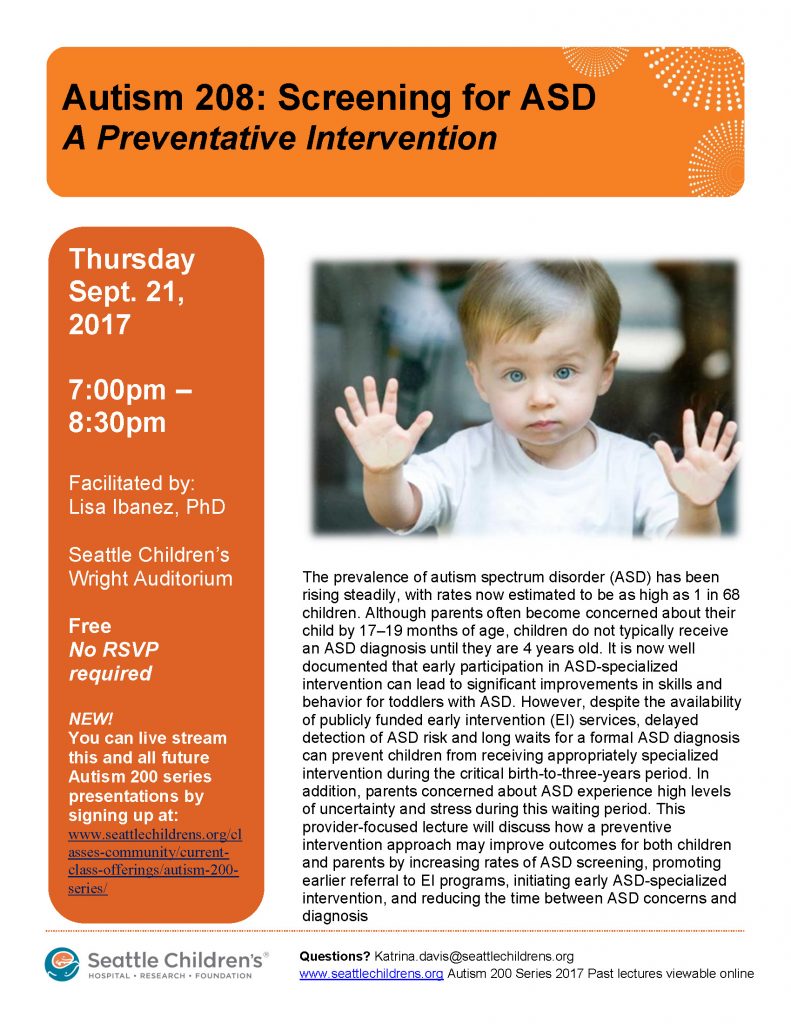
Looking for an early childhood program for your child?
Whether you’re a first-time parent or a well-seasoned one, choosing an early childhood program can be tough! The American Psychological Association (APA) just published a new guide with “must ask” questions for parents seeking a quality program. They recommend spending some time in the program, and finding answers to 5 main questions: (1) What’s happening in the classroom?; (2) How are teachers and children getting along?; (3) How do teachers guide and, when needed, redirect children’s behaviors?; (4) How do teachers talk with children?; and (5) How do teachers communicate with parents? The following webpage contains links to the “High 5” brochure as well as an annotated bibliography: High Five: Searching for the Best Early Childhood Program
Implementation researchers swarm UW
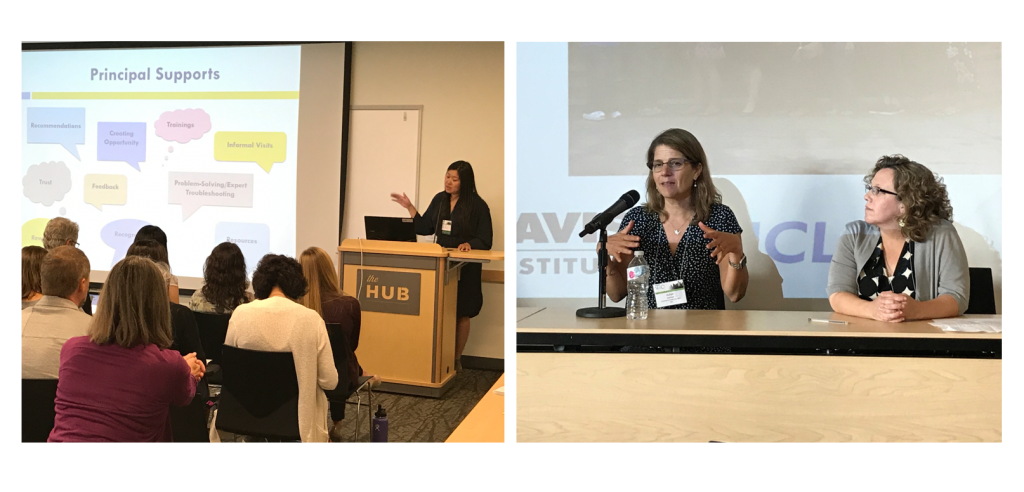 Last week the Society for Implementation Research Collaboration (SIRC) held its 4th annual conference at the UW HUB. Community-based autism research was represented by Jill Locke, from UW (left), and Aubyn Stahmer and Lauren Brookman-Frazee (right), from UC-Davis and UC-San Diego. Both groups of researchers work with teachers in public school classrooms to implement evidence-based practices with their students. The READi Lab hopes to have data to present by the time the next SIRC meeting rolls around!
Last week the Society for Implementation Research Collaboration (SIRC) held its 4th annual conference at the UW HUB. Community-based autism research was represented by Jill Locke, from UW (left), and Aubyn Stahmer and Lauren Brookman-Frazee (right), from UC-Davis and UC-San Diego. Both groups of researchers work with teachers in public school classrooms to implement evidence-based practices with their students. The READi Lab hopes to have data to present by the time the next SIRC meeting rolls around!
How accurate are media portrayals of autism?
In recent years, there has been a significant increase in the number of films and TV series that include characters with autism. In many shows, the term ‘autism’ is mentioned explicitly (e.g., Atypical), while in others, diagnostic assumptions are made by viewers (e.g., Big Bang Theory). A new article published in ‘Psychiatry Research’ sought to determine how accurate these media portrayals of autism are. The study analyzed 26 media characters with reference to the standard diagnostic criteria provided in DSM-5, and found that the characters’ behaviors are highly consistent with diagnostic criteria. However, many characters exhibited all or most of the diagnostic criteria, which suggests that their depiction may be ‘unrealistically perfect’ or ‘archetypal’ rather than reflecting the more typical nuanced and varied presentation of autism from one individual to the next. While no single fictional character can truly capture the diversity of the entire autism spectrum, we hope that media depictions of autism will strive to improve community awareness and understanding of the more subtle and realistic manifestations of autism.
Dan Marino Foundation scores a touchdown for autism!
“George glares at me from behind his desk. His hair is buzzed short and his mouth is set in a sneer. He asks about my prior work experience, then replies sarcastically, ‘Okay, well, what you’d be doing here would be a little different from that.’ This would be the toughest job interview I’ve ever been on, if it were real.”
But it’s NOT real. George is a digital avatar, a “virtual job interviewer” used to teach interview and workplace skills to young adults with autism. A recent article in “Spectrum News” highlighted the fact that many very capable individuals with autism have difficulty finding jobs after high school due to a lack of relevant experience, as well as social-communication issues that make the interview process challenging. As part of a nationwide effort, the Dan Marino Foundation (DMF) in Fort Lauderdale, Florida is using innovative technology to increase employment opportunities and support services for adults with autism. Together with researchers at the University of Southern California, the DMF team developed “ViTA DMF,” a virtual interviewing software that uses avatars to simulate a real job interview.
Check out the full Spectrum News article here!
For more information about George and the VITA DMF project, contact vita@vitadmf.org.
In addition, organizations such as Autism Speaks and the Arc offer other online resources and materials for potential employees as well as employers. An employer’s guide to hiring and retaining employees with ASD can be found here!
Target unveils new line of “sensory-friendly” clothing designed for children with special needs
“I can finally say goodbye to the days of sewing patches in shirts where the tags used to be, and say goodbye to tears from clothes being ‘too scratchy’. On behalf of all moms of kids with sensory sensitivities: thank you, Target!” – Cindy Brown, mother of child with ASD
Check out the full line of clothing here!
A Double Feature!
Earlier this week, the SRT team conducted a training workshop on Reciprocal Imitation Training (RIT) at Skagit Preschool and Resource Center (SPARC). Attendees learned about the theory behind RIT, as well as how it’s used in practice. The very next day providers returned for another workshop on the Screening Tool for Autism in Toddlers (STAT). The attendees were a wonderful mix of early intervention providers, family resource coordinators, speech and occupational therapists, and others, who brought a wide range of perspectives. During the second half of both trainings, attendees got hands-on experience with the help of some playful volunteers! Next week we will complete our Skagit County trainings with a workshop on the online M-CHAT-R/F at Skagit Pediatrics.
Regression in ASD: A changing conceptualization
Regression, or the loss of established skills, used to be considered an “all or nothing” phenomenon: a child with ASD either experienced regression or s/he didn’t. However, research conducted over the past 15 years suggests that that this dichotomy is an oversimplification, and regression is a much more common and nuanced occurrence than thought previously.
“Spectrum News” reports on a meeting of ASD experts sponsored by NIH earlier this year to address the topic of regression in ASD. The gist of the article, which can be accessed here, is that the trajectories of skill development and loss are so different from child to child that the binary notion of regression or no regression becomes meaningless. In fact, early signs of ASD are likely to be present in infancy, though they are challenging to detect because they are subtle and variable in presentation. Moving away from the concept of regression, and toward the strategy of identifying different patterns of ASD onset, may yield more useful information about the early development of ASD.
The SRT Team Heads North!
Yesterday, the Screen-Refer-Treat (SRT) Study Team kicked off the training phase for Skagit County with a workshop on the Online M-CHAT-R/F for primary care providers (PCPs) from Skagit Regional Clinics-Riverbend. The workshop covered topics including the early behavioral features of ASD, the use of the online M-CHAT-R/F screener at 18-month well-child visits, how to talk to parents about concerns (and respond when they present concerns), and provided up-to-date information about referral processes and local resources. We are looking forward to our remaining training workshops in the county with Skagit Pediatrics and the Skagit Preschool and Resource Center (SPARC) over the next two weeks!
READi Lab receives $900,000 dollar grant from HRSA!
We are thrilled to announce that Dr. Wendy Stone has been awarded a 3-year grant from the Health Resources and Services Administration (HRSA). The purpose of our new PATHWAYS Study is to increase the number of routes available for accessing early detection and intervention for toddlers from Hispanic and low income families in King County, WA. We will be building community capacity for providing specialized screening, intervention, and family-centered care by training and engaging with Primary Care Providers (PCPs), Early Intervention Providers (e.g., IDEA Part C), and Early Learning Providers (i.e., home visitors). We are excited for this opportunity to work with stakeholders, community providers, and families in our very own “backyard”!
New Autism Health Report
The medical community now considers autism a “whole-body disorder” because there are myriad health complications that can accompany an ASD diagnosis. Autism Speaks recently released a special report that describes advances in our understanding and treatment of these health conditions that are commonly associated with ASD. In the report, you’ll find information about seizures, gastrointestinal disorders, sleep disturbances, eating and feeding challenges, ADHD, anxiety, depression, and schizophrenia. Currently, researchers all over the world are working to better understand these conditions to help improve the quality of life for individuals with autism. Click on the link below to see the full report, and please feel free to share with anyone who might find it helpful!
Is Social Gaze Driven by Genetics?
A recent study published in Nature suggests that the answer is Yes! Researchers compared eye gaze patterns of (non-autistic) identical twins, fraternal twins, and unrelated children while they watched videos of social interactions. Results revealed that the identical twin pairs spent similar amounts of time looking at the eyes of the people on the screen; in fact, the amount of time one identical twin spent looking at eyes matched the other identical twin 91% of the time. The match was 35% for fraternal twins, and 16% for unrelated children.
Why does this matter? Identical twins share 100% of their genes, whereas fraternal twins (and non-twin siblings) share only about 50% of the same genes. The fact that there was much more concordance in looking at eyes for the identical twins suggests that that this behavior is strongly influenced by genetics. In other words, it suggests that social gaze patterns are heritable. If we can understand the genetic processes that underlie the behavior of “seeking out” social information from eyes, we may eventually learn how this behavior develops differently in children with autism.
Weird Science
Scientists have figured out a way to encode a movie clip (of running horses) into the DNA of living cells, and then play it back from the DNA (with 90% accuracy). While it’s still in its early stages, the idea is to see whether brain cells can behave like “recorders” of our genome activity over time. This technique may eventually help us understand the unfolding development of the human brain, without using intrusive methods. We couldn’t help ourselves – we had to post this article! The video clip is long, but the excerpts are fascinating. Check it out for yourself!
“Swim Team” documentary makes a big splash!
“Swim Team” is a new documentary by Laura Stolman about 3 teenage boys who swim for the New Jersey Hammerheads, a YMCA team for individuals with autism. The film chronicles the triumphs and challenges these boys face both in the pool and in everyday life. The film delivers an inspirational message to the autism community and anyone who’s been told they’ll always be stuck on the sidelines. You can watch the trailer here. While the documentary has not been released to the public, interested organizations can request to host a screening in their area. For more information about the movie or hosting a screening, go here.
Free World Wide Webinars from the INSAR Summer Institute!
Attention students, clinicians, stakeholders, and parents interested in autism research! The International Society for Autism Research (INSAR) is hosting a free 6-week webinar series focusing on culture and diversity in autism research. Topics include: autism in low-resource settings, adapting assessments or intervention for diverse communities, cross-cultural views of autism, and autism and bilingualism. The series begins on July 13, and viewers will have the chance to ask questions or leave comments at the end of each 2-hour webinar. For more information or to register for the series, visit the INSAR website here: http://www.autism-insar.org/general/custom.asp?page=SI2017
- « Previous Page
- 1
- …
- 15
- 16
- 17
- 18
- 19
- …
- 27
- Next Page »
